《物业常用服务英语》PPT课件
- 格式:ppt
- 大小:481.50 KB
- 文档页数:2
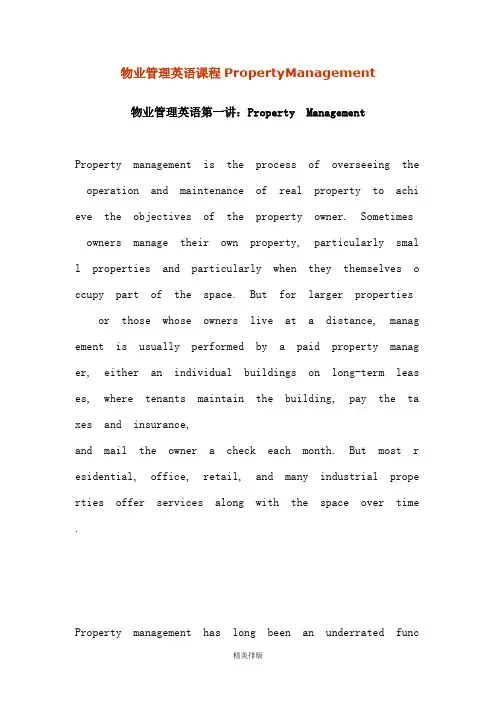
物业管理英语课程PropertyManagement物业管理英语第一讲:Property ManagementProperty management is the process of overseeing the operation and maintenance of real property to achi eve the objectives of the property owner. Sometimes owners manage their own property, particularly smal l properties and particularly when they themselves o ccupy part of the space. But for larger properties or those whose owners live at a distance, manag ement is usually performed by a paid property manag er, either an individual buildings on long-term leas es, where tenants maintain the building, pay the ta xes and insurance,and mail the owner a check each month. But most r esidential, office, retail, and many industrial prope rties offer services along with the space over time .Property management has long been an underrated function in the real estate industry. The need for p rofessional management did not become apparent until the depression of the 1930s, when numerous foreclo sures revealed a pattern of management deficiencies. This oversight might seem strange, since running a large commercial or residential project in which hundreds or thousands of people reside or work is a highly challenging task, calling for training, g ood judgment, variety of technical skills. Traditiona lly, however, emphasis in the real estate industry has been on the so permanent elements of the inves tment-good location, construction, and reasonable long -term financing-than on the day-to-day operation of the property. It has sometimes seemed as if a pr operty owner, having made a very large investment i n the permanent structure, assumed that the property would run itself with a minimum amount of supervi sion.This concept of property management has changed subs tantially in the past decade. In an era of rising costs, it has dawned on owners that good propertymanagement is the major controllable influence on residual cash flow (i. e., the number of dollars t hat end up in the owner’s pocket). It is true that both rent rates and op erating expenses are largely shaped by market forces beyond the control of any one property owner (wit ness the very sharp rise in energy costs in the 1 970s). But it is also true that comparable properti es within the same geographic area often show signi ficant variances in rental income and operating cost s. Why? Close inspection often shows that “above-av erage”operating expenses and lower than average re nt levels result from inadequate property management.The classic mistake of the stock and bond investor moving into real estate involves underestimating th e importance of management. Some investors have the feeling that real estate manages itself.There is a story about the importance of property management. A San Francisco real estate broker recently noticed a project that was on the market for $1 million. He knew how the property had been mana ged in the past and that the million dollar valuat ion was based on a capitalization of historic inc ome figure. He borrowed money to buy the property, renegotiated certain leases, and established more e fficient operating procedures. In six months he sold the property for $1.4 million based on the capita lized value of the new, higher net income. His con tribution was management expertise.Useful Expressions:at a distance 在远处along with 和,同,与……一道;加之call for 需要;要求rather than 而不是dawn on 开始(被人)理解,渐渐(使人)明白end up 结束,结尾;停止result for 由于,是……的结果be based on 基于;以……为根据Notes:1. Property management is the process of overseeing the operation and maintenanceof real property to achieve the objectives of the property owner.此句中,动词不定式to achieve the objectives of the property owner作目的状语。
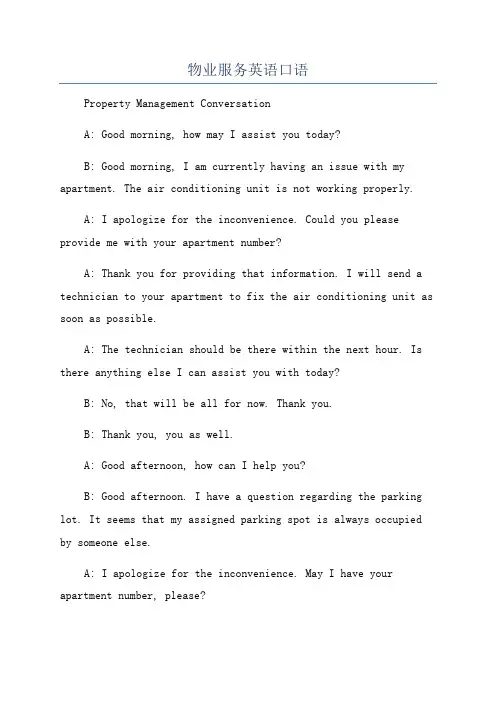
物业服务英语口语Property Management ConversationA: Good morning, how may I assist you today?B: Good morning, I am currently having an issue with my apartment. The air conditioning unit is not working properly.A: I apologize for the inconvenience. Could you please provide me with your apartment number?A: Thank you for providing that information. I will send a technician to your apartment to fix the air conditioning unit as soon as possible.A: The technician should be there within the next hour. Is there anything else I can assist you with today?B: No, that will be all for now. Thank you.B: Thank you, you as well.A: Good afternoon, how can I help you?B: Good afternoon. I have a question regarding the parking lot. It seems that my assigned parking spot is always occupied by someone else.A: I apologize for the inconvenience. May I have your apartment number, please?A: Thank you for the information. I will look into this matter and ensure that your assigned parking spot is available for you in the future.B: That would be great. Thank you for your help.B: Thank you, you too.A: Good morning, how may I assist you today?B: The issues are in the lobby area and the staircase leading to the upper floors.A: I apologize for the inconvenience. I will have our maintenance team address these issues immediately. Is there anything else you would like to report?B: That's all for now. I appreciate your prompt response.B: Thank you, you as well.A: Good afternoon, how can I assist you?A: Yes, there is a nominal fee to cover the maintenance and cleaning expenses. You can find the fee schedule on our website or inquire at the office.B: I see. I will make sure to check the website for more details. Thank you for your help.B: Thank you, you too.A: Good morning, how may I assist you today?B: Good morning. I have been experiencing some issues with the garbage disposal system in my apartment.A: I apologize for the inconvenience. Can you provide me with your apartment number, please?A: Thank you for the information. I will send a technician to your apartment as soon as possible to address the problem with the garbage disposal.A: The technician should be there within the next hour. Is there anything else I can assist you with today?B: No, that will be all for now. Thank you.B: Thank you, you as well.。

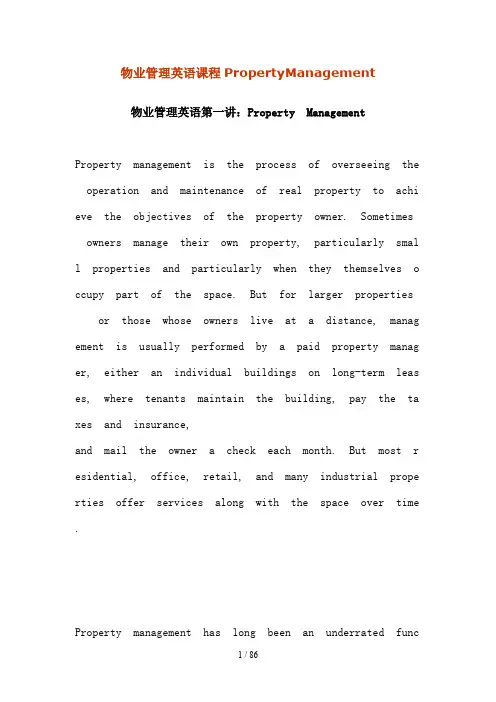
物业管理英语课程PropertyManagement物业管理英语第一讲:Property ManagementProperty management is the process of overseeing the operation and maintenance of real property to achi eve the objectives of the property owner. Sometimes owners manage their own property, particularly smal l properties and particularly when they themselves o ccupy part of the space. But for larger properties or those whose owners live at a distance, manag ement is usually performed by a paid property manag er, either an individual buildings on long-term leas es, where tenants maintain the building, pay the ta xes and insurance,and mail the owner a check each month. But most r esidential, office, retail, and many industrial prope rties offer services along with the space over time .Property management has long been an underrated function in the real estate industry. The need for p rofessional management did not become apparent until the depression of the 1930s, when numerous foreclo sures revealed a pattern of management deficiencies. This oversight might seem strange, since running a large commercial or residential project in which hundreds or thousands of people reside or work is a highly challenging task, calling for training, g ood judgment, variety of technical skills. Traditiona lly, however, emphasis in the real estate industry has been on the so permanent elements of the inves tment-good location, construction, and reasonable long -term financing-than on the day-to-day operation of the property. It has sometimes seemed as if a pr operty owner, having made a very large investment i n the permanent structure, assumed that the property would run itself with a minimum amount of supervi sion.This concept of property management has changed subs tantially in the past decade. In an era of rising costs, it has dawned on owners that good propertymanagement is the major controllable influence on residual cash flow (i. e., the number of dollars t hat end up in the owner’s pocket). It is true that both rent rates and op erating expenses are largely shaped by market forces beyond the control of any one property owner (wit ness the very sharp rise in energy costs in the 1 970s). But it is also true that comparable properti es within the same geographic area often show signi ficant variances in rental income and operating cost s. Why? Close inspection often shows that “above-av erage”operating expenses and lower than average re nt levels result from inadequate property management.The classic mistake of the stock and bond investor moving into real estate involves underestimating th e importance of management. Some investors have the feeling that real estate manages itself.There is a story about the importance of property management. A San Francisco real estate broker recently noticed a project that was on the market for $1 million. He knew how the property had been mana ged in the past and that the million dollar valuat ion was based on a capitalization of historic inc ome figure. He borrowed money to buy the property, renegotiated certain leases, and established more e fficient operating procedures. In six months he sold the property for $1.4 million based on the capita lized value of the new, higher net income. His con tribution was management expertise.Useful Expressions:at a distance 在远处along with 和,同,与……一道;加之call for 需要;要求rather than 而不是dawn on 开始(被人)理解,渐渐(使人)明白end up 结束,结尾;停止result for 由于,是……的结果be based on 基于;以……为根据Notes:1. Property management is the process of overseeing the operation and maintenanceof real property to achieve the objectives of the property owner.此句中,动词不定式to achieve the objectives of the property owner作目的状语。
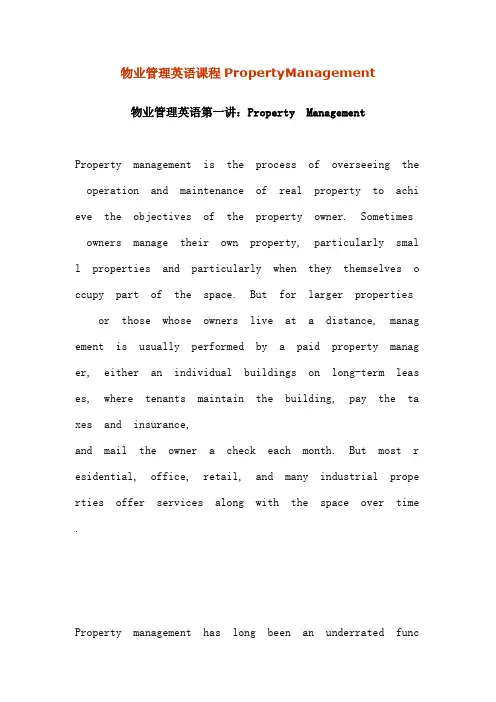
物业管理英语课程PropertyManagement物业管理英语第一讲:Property ManagementProperty management is the process of overseeing the operation and maintenance of real property to achi eve the objectives of the property owner. Sometimes owners manage their own property, particularly smal l properties and particularly when they themselves o ccupy part of the space. But for larger properties or those whose owners live at a distance, manag ement is usually performed by a paid property manag er, either an individual buildings on long-term leas es, where tenants maintain the building, pay the ta xes and insurance,and mail the owner a check each month. But most r esidential, office, retail, and many industrial prope rties offer services along with the space over time .Property management has long been an underrated function in the real estate industry. The need for p rofessional management did not become apparent until the depression of the 1930s, when numerous foreclo sures revealed a pattern of management deficiencies. This oversight might seem strange, since running a large commercial or residential project in which hundreds or thousands of people reside or work is a highly challenging task, calling for training, g ood judgment, variety of technical skills. Traditiona lly, however, emphasis in the real estate industry has been on the so permanent elements of the inves tment-good location, construction, and reasonable long -term financing-than on the day-to-day operation of the property. It has sometimes seemed as if a pr operty owner, having made a very large investment i n the permanent structure, assumed that the property would run itself with a minimum amount of supervi sion.This concept of property management has changed subs tantially in the past decade. In an era of rising costs, it has dawned on owners that good propertymanagement is the major controllable influence on residual cash flow (i. e., the number of dollars t hat end up in the owner’s pocket). It is true that both rent rates and op erating expenses are largely shaped by market forces beyond the control of any one property owner (wit ness the very sharp rise in energy costs in the 1 970s). But it is also true that comparable properti es within the same geographic area often show signi ficant variances in rental income and operating cost s. Why? Close inspection often shows that “above-av erage”operating expenses and lower than average re nt levels result from inadequate property management.The classic mistake of the stock and bond investor moving into real estate involves underestimating th e importance of management. Some investors have the feeling that real estate manages itself.There is a story about the importance of property management. A San Francisco real estate broker recently noticed a project that was on the market for $1 million. He knew how the property had been mana ged in the past and that the million dollar valuat ion was based on a capitalization of historic inc ome figure. He borrowed money to buy the property, renegotiated certain leases, and established more e fficient operating procedures. In six months he sold the property for $1.4 million based on the capita lized value of the new, higher net income. His con tribution was management expertise.Useful Expressions:at a distance 在远处along with 和,同,与……一道;加之call for 需要;要求rather than 而不是dawn on 开始(被人)理解,渐渐(使人)明白end up 结束,结尾;停止result for 由于,是……的结果be based on 基于;以……为根据Notes:1. Property management is the process of overseeing the operation and maintenanceof real property to achieve the objectives of the property owner.此句中,动词不定式to achieve the objectives of the property owner作目的状语。



物业管理英语培训课程(英文版)(doc 84页)物业管理英语课程PropertyManagement物业管理英语第一讲:Property ManagementProperty management is the process of overseeing th e operation and maintenance of real property to ac hieve the objectives of the property owner. Sometim es owners manage their own property, particularly s mall properties and particularly when they themselve s occupy part of the space. But for larger proper ties or those whose owners live at a distance, management is usually performed by a paid property manager, either an individual buildings on long-te rm leases, where tenants maintain the building, pay the taxes and insurance,and mail the owner a check each month. But most residential, office, retail, and many industrial pro perties offer services along with the space over t ime.g costs, it has dawned on owners that good proper ty management is the major controllable influence o n residual cash flow (i. e., the number of dollar s that end up in the owner’s pocket). It is true that both rent rates and o perating expenses are largely shaped by market forc es beyond the control of any one property owner ( witness the very sharp rise in energy costs in th e 1970s). But it is also true that comparable pro perties within the same geographic area often show significant variances in rental income and operati ng costs. Why? Close inspection often shows that “above-average”operating expenses and lower than average rent levels result from inadequate property management.The classic mistake of the stock and bond investor moving into real estate involves underestimating t he importance of management. Some investors have th e feeling that real estate manages itself.There is a story about the importance of propertymanagement. A San Francisco real estate broker re cently noticed a project that was on the market f or $1 million. He knew how the property had been managed in the past and that the million dollar valuation was based on a capitalization of histor ic income figure. He borrowed money to buy the property, renegotiated certain leases, and establishe d more efficient operating procedures. In six month s he sold the property for $1.4 million based on the capitalized value of the new, higher net inc ome. His contribution was management expertise.Useful Expressions:at a distance 在远处along with 和,同,与……一道;加之call for 需要;要求rather than 而不是dawn on 开始(被人)理解,渐渐(使人)明白end up 结束,结尾;停止result for 由于,是……的结果be based on 基于;以……为根据Notes:1. Property management is the process of overseeing the operation and maintenanceof real property to achieve the objectives of the property owner.此句中,动词不定式to achieve the objectives of the property owner作目的状语。
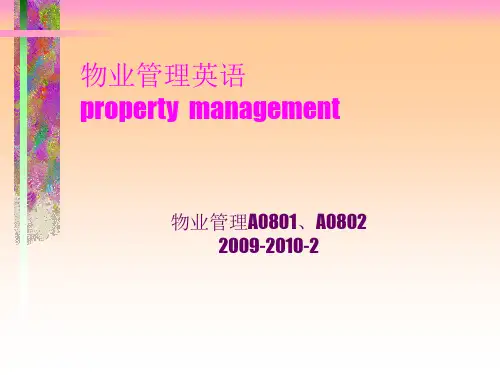


物业有哪些常用的英语物业服务行业对人员领域几乎都有涉及到,那么,面对一些外来人员,物业人员需要用英语进行沟通。
那么,物业常用的英语都哪些呢?下面由店铺为你提供的相关资料,希望能帮到你。
物业常用英语一、物业服务类:1、Hi! Can I help you?/How can I help you?/Are you being helped?您好!你有什么事吗?2、Did you make an appointment with him/her?你跟他/她预约了吗?3、One moment please, let me call him/her first.稍等,我给他/她打个电话.4、 Sorry to have kept you waiting.抱歉,让你久等了.5、 Would you like to show me your room card?你能够出示一下你的房卡吗?二、工程管理类:1、I am a manager. (project manager, resident construction manager, construction superintendent,controller ,staff member, engineer, technician, economist, supervisor, foreman, worker) 我是经理.(项目经理、驻工地总代表、工地主任、管理员、职员、工程师、技术员、经济员、检查员、工长、工人).2、My technical specialty is civil engineering.(chemical engineering, process, mechanical equipment ,electrical, instrumentation, piping, welding, furnace building, corrosion prevention, thermal-insulation, heating-ventilation, quality control).我的技术专业是土建工程.(化工工程、工艺、机械设备、电气、仪表、管道、焊接、筑炉、防腐、保温、采暖通风、质量管理).3、This is the mechanician(electrician, pipelayer, welder, carpenter, turner, blacksmith, builder, erector,riveter, rigger, concrete worker, engine-driver, repair worker).这是机械钳工.(电工、管工、焊工、木工、车工、铁工、建筑工人、安装工人、铆工、起重工、混凝土工、司机、修理工).4、Our construction site is south of Guangzhou, near the Zhujiang River.我们的工地在广州以南,靠近珠江.5、This is a plot plan (general layout ,general arrangement, detail ,section, erection ,flow sheet, PID,assembly, civil, electrical, control and instrumentation, projection, piping, isometric ) drawing.这是一张平面布置(总平面、总布置、细部、剖面、安装、流程、带仪表控制点的管道、装配、土建、电气、自控和仪表、投影、配管、空视)图.三、商务洽谈类:1、We'd like to express our desire to establish business relationship with you on the basis of quality, mutually benefit and exchange of needed goods .我们希望在保证质量、互惠互利以及交易彼此需要的货物的基础上和你们建立业务关系。
物业客服日常英语单词汇总日常用词:电水燃气灯灯泡电视信号窗帘窗户厨房卧室electricity water gas light bulb TV signal curtain window kitchen bedroom洗手间书房走廊电梯垃圾垃圾房大堂保洁washroom sanctum passage elevator rubbish garbage room lobby in-door cleaning保安花健身房游泳池会所高尔夫地下一层楼层车证guard flower gym natatorium chamber golf basement 1 floor parking card空调天花板阳台沙发电脑上网费用air-condition ceiling terrace sofa computer connect to the internet fee/ charge/expense没电没水没燃气财务钱发票租赁部收据帐单no electricity no water no gas finance money invoice leasing-department receipt bill工程部经理主管客服银行办公室星城engineering department manager director customer service bank office Star City公司公寓维修挂画门大门玻璃锁茶几抽屉company apartment repair hang picture door gate glass lock tea table drawer插座插头开关冷水热水矿泉水纯净水杯子茶socket plug switch cold water hot water table-water pureness water cup tea茶杯茶壶前台文件柜计算器地板木地板微波炉tea cup teapot front desk file ark calculator floor wood floor microwave oven电冰箱电磁炉烤箱锅墙壁fridge/ refrigerator induction cooker oven pan wall公共场所:公园图书馆电影院托儿所餐厅饭店旅馆/酒店颐和园park library cinema nursery dinning room restaurant hotel Summer Palace长城故宫雍和宫天坛博物馆音乐厅火车站Great Wall The Imperial Palace Lama temple TianTan Park museum odeum railway station汽车站医院诊所剧场bus station hospital clinic theater5)家电:电视遥控器电冰箱电暖气电水壶空调TV/Television controller fridge/refrigerator electric radiator electric water jug air-condition饮水机台灯日光灯电风扇扇子洗衣机电熨斗water dispenser reading lamp daylight lamp fanner fan washing machine iron麦克风电脑显示器键盘硬件软件硬盘内存microphone computer display keyboard hardware software hard disk/HD EMS memory主板鼠标电线视频电话线电火锅电吹风mainboard mouse wire video frequency telephone line/ line electric chaffy dish hair drier6)日常用品:1、卧室:bedroom被子枕头床单床垫床床头灯拖鞋床头柜衣柜梳妆台quilt pillow bed sheet mattress bed bed lamp slipper bed stand bureau dresser睡衣睡袍衬衣衣服毛衣内衣裤袜子被套枕套night-suit gown shirt clothing sweater underwear socks quilt cover pillowslip2、卫生间:bathroom毛巾马桶浴帘浴竿水龙头牙刷牙膏肥皂香皂towel closestool shower shade shower rod tap toothbrush toothpaste soap fancy soap洗发水浴液梳子洗面奶浴巾浴室剃须刀毛巾架shampoo shower cream comb Turkish towel bathroom shaver towel rack喷头浴缸马桶刷消毒液镜子浴室镜shower bathtub closestool brush disinfecting liquid mirror mirror in the bathroom护发素洗脸盆门插销钥匙地漏hair conditioner basin/bason bolt key drain3、厨房用品:kitchen things平底锅炒锅刀子水果刀盘子刀叉筷子碗勺子pan hollowware knife fruit knife plate/dish fork and knife chopsticks bowl spoon锅铲菜刀砧板吸油烟机餐桌椅电饭煲pancake turner kitchen knife chopping block air hooker tables and chairs electric cooker。